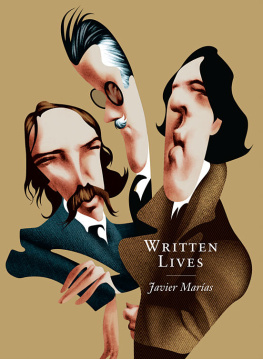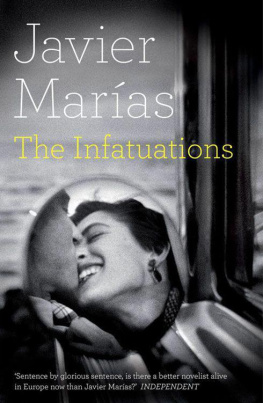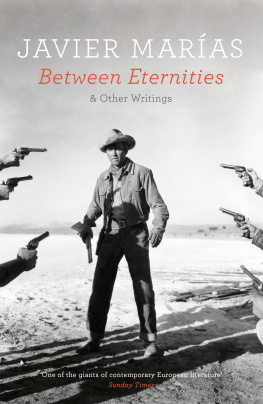Javier Maras
Your Face Tomorrow
1: Fever and Spear
TRANSLATED FROM THE SPANISH BY
Margaret Jull Costa
VINTAGE BOOKS
London
Published by Vintage 2006
468 10 9753
Copyright Javier Marias 2002 Translation copyright Margaret Jull Costa 2005
Javier Marias has asserted his right under the Copyright, Designs and Patents Act, 1988 to be identified as the author of this work
This book is sold subject to the condition that it shall not by way of trade or otherwise, be lent, resold, hired out, or otherwise circulated without the publisher's prior consent in any form of binding or cover other than that in which it is published and without a similar condition including this condition being imposed on the subsequent purchaser
First published in 2002 with the title Tu rostro maana (1 Fiebre y lanza) by Alfaguara, Spain
First published in Great Britain in 2005 by Chatto 8c Windus
Vintage
Random House, 20 Vauxhall Bridge Road, London SW1V2SA
Random House Australia (Pty) Limited 20 Alfred Street, Milsons Point, Sydney, New South Wales 2061, Australia
Random House New Zealand Limited 18 Poland Road, Glenfield, Auckland 10, New Zealand
Random House (Pty) Limited Isle of Houghton, Corner of Boundary Road & Carse O'Gowrie, Houghton, 2198, South Africa
Random House Publishers India Private Limited 301 World Trade Tower, Hotel Intercontinental Grand Complex, Barakhamba Lane, New Delhi 110 001, India
The Random House Group Limited Reg. No. 954009
A CIP catalogue record for this book is available from the British Library
The author and publishers make grateful acknowledgement to Ian Fleming Publications Ltd for permission to reproduce an extract from From Russia With Love Gildrose Publications Ltd 1957
ISBN 9780099461999 (from Jan 2007) ISBN 0099461994
Papers used by Random House are natural, recyclable products made from wood grown in sustainable forests. The manufacturing processes conform to the environmental regulations of the country of origin
Printed and bound in Great Britain by Cox & Wyman Limited, Reading, Berkshire
For Carmen Lopez M, who will, I hope, want to go on listening to me
And for Sir Peter Russell,
to whom this book is indebted
for his long shadow,
and the author,
for his far-reaching friendship
The translator would like to thank Javier Maras, Annella McDermott, Palmira Sullivan, Antonio Martin and Ben Sherriff for all their help and advice.
1 Fever
One should never tell anyone anything or give information or pass on stories or make people remember beings who have never existed or trodden the earth or traversed the world, or who, having done so, are now almost safe in uncertain, one-eyed oblivion. Telling is almost always done as a gift, even when the story contains and injects some poison, it is also a bond, a granting of trust, and rare is the trust or confidence that is not sooner or later betrayed, rare is the close bond that does not grow twisted or knotted and, in the end, become so tangled that a razor or knife is needed to cut it. How many of my confidences remain intact, of all those I have offered up, I, who have always laid such store by my own instinct and yet have still sometimes failed to listen to it, I, who have been ingenuous for far too long? (Less so now, less, but these things are very slow to fade.) The confidences I shared with two friends remain preserved and intact, unlike those granted to another ten who lost or destroyed them; the meagre confidences shared with my father, and the chaste ones vouchsafed to my mother, which were very similar, if not the same, although those granted to her did not last very long, and she can no longer break them or, at least, only posthumously, if, one day, I were to make some unfortunate discovery, and something that was hidden ceased to be hidden; gone are the confidences given to sister, girlfriend, lover or wife, past, present or imaginary (the sister is usually the first wife, the child wife), for in such relationships it seems almost obligatory that one should, in the end, use what one knows or has seen against the beloved or the spouse or the person who turns out to have been only momentary warmth and flesh against whoever it was who proffered revelations and allowed a witness to their weaknesses and sorrows and was ready to confide, or against the person who absent-mindedly reminisced out loud on the pillow not even aware of the dangers, of the arbitrary eye always watching or the selective, biased ear always listening (often it's nothing very serious, for domestic use only, when cornered or on the defensive, to prove a point if caught in a tight dialectical spot during a prolonged discussion, then it has a purely argumentative application).
The violation of a confidence is also this: not just being indiscreet and thereby causing harm or ruin, not just resorting to that illicit weapon when the wind changes and the tide turns on the person who did the telling and the revealing and who now regrets having done so and denies it and grows confused and sombre, wishing he could wipe the slate clean, and who now says nothing it is also profiting from the knowledge obtained through another's weakness or carelessness or generosity, and not respecting or remembering the route by which we came to know the information that we are now manipulating or twisting sometimes it's enough just to say something out loud for the air to grasp and distort it: be it the confession of a night of love or of one desperate day, or of a guilty evening or a desolate awakening, or the drunken loquacity of an insomniac: a night or a day when the person talking talked as if there were no future beyond that night or that day and as if their loose tongue would die with them, not knowing that there is always more to come, that there is always a little more, one minute, the spear, one second, fever, another second, sleep and dreams spear, fever, my pain, words, sleep and dreams and then, of course, there is interminable time that does not even pause or slow its pace after our final end, but continues to make additions and to speak, to murmur, to ask questions and to tell tales, even though we can no longer hear and have fallen silent. To fall silent, yes, silent, is the great ambition that no one achieves not even after death, and I least of all, for I have often told tales and even written reports, more than that, I look and I listen, although now I almost never ask questions. No, I should not tell or hear anything, because I will never be able to prevent it from being repeated or used against me, to ruin me or worse still from being repeated and used against those I love, to condemn them.
And then there is distrust, of which there has been no shortage in my life either.
It's interesting how the law takes this into account and, even odder, takes the trouble to warn us: when someone is arrested, at least in films, he is allowed to remain silent, because, as he is immediately informed, 'anything you say can be used against you'. There is in this warning a strange or indecisive and contradictory desire not to play entirely dirty. That is, the prisoner is told that the rules will, from now on, be dirty, he is informed and reminded that, somehow or other, they are going to catch him out and will make the most of any blunders, lapses and mistakes he might make he is no longer a suspect, but an accused man whose guilt they are going to try to prove, whose alibis they will try to destroy, he has no right to impartiality, not between now and the day he appears in court all their efforts will be channelled into gathering the evidence that will condemn him, all their vigilance and monitoring and investigation and research into collecting the clues that will incriminate him and support their decision to arrest him. And yet they offer him the opportunity to remain silent, indeed, almost urge it upon him; they tell him about this right which he may have known nothing about, and therefore, sometimes, actually put the idea in his head: not to open his mouth, not even to deny what he is being accused of, not to run the risk of having to defend himself alone; remaining silent appears or is presented as being clearly the most sensible option, one that could save us even if we know ourselves to be and are guilty, as the only way in which this self-declared dirty game can be rendered ineffectual or barely practicable, or at least not with the involuntary and ingenuous collaboration of the prisoner: 'You have the right to remain silent'; in America, they call it the Miranda law and I'm not even sure if its equivalent exists in our countries, they used it on me once, a long time ago, well, not that long ago, but the policeman got it wrong, left out a bit, he forgot to say 'in court' when he rattled off the famous phrase, 'anything you say can be used against you', there were witnesses to this omission and the arrest was invalidated. The same strange spirit imbues that other right of the accused, not to testify against himself, not to prejudice himself verbally with his story or his answers, with his contradictions or stumblings. Not to harm himself by his own narrative (which can, indeed, cause great harm), in other words, to lie.
Next page







